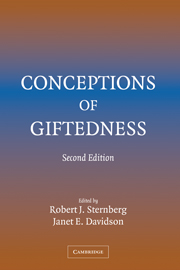Book contents
- Frontmatter
- Contents
- Preface
- List of Contributors
- 1 Gifted Education Without Gifted Children: The Case for No Conception of Giftedness
- 2 Youths Who Reason Exceptionally Well Mathematically and/or Verbally: Using the MVT:D4 Model to Develop Their Talents
- 3 A Child-Responsive Model of Giftedness
- 4 School-Based Conception of Giftedness
- 5 Giftedness, Talent, Expertise, and Creative Achievement
- 6 Permission to Be Gifted: How Conceptions of Giftedness Can Change Lives
- 7 From Gifts to Talents: The DMGT as a Developmental Model
- 8 Nurturing Talent in Gifted Students of Color
- 9 The Munich Model of Giftedness Designed to Identify and Promote Gifted Students
- 10 Systemic Approaches to Giftedness: Contributions of Russian Psychology
- 11 Giftedness and Gifted Education
- 12 The Importance of Contexts in Theories of Giftedness: Learning to Embrace the Messy Joys of Subjectivity
- 13 Feminist Perspectives on Talent Development: A Research-Based Conception of Giftedness in Women
- 14 The Three-Ring Conception of Giftedness: A Developmental Model for Promoting Creative Productivity
- 15 In Defense of a Psychometric Approach to the Definition of Academic Giftedness: A Conservative View from a Die-Hard Liberal
- 16 Creative Giftedness
- 17 Genetics of Giftedness: The Implications of an Emergenic–Epigenetic Model
- 18 The WICS Model of Giftedness
- 19 Beyond Expertise: Conceptions of Giftedness as Great Performance
- 20 Domain-Specific Giftedness: Applications in School and Life
- 21 Extreme Giftedness
- 22 Making Giftedness Productive
- 23 The Actiotope Model of Giftedness
- 24 The Scientific Study of Giftedness
- Author Index
- Subject Index
19 - Beyond Expertise: Conceptions of Giftedness as Great Performance
- Frontmatter
- Contents
- Preface
- List of Contributors
- 1 Gifted Education Without Gifted Children: The Case for No Conception of Giftedness
- 2 Youths Who Reason Exceptionally Well Mathematically and/or Verbally: Using the MVT:D4 Model to Develop Their Talents
- 3 A Child-Responsive Model of Giftedness
- 4 School-Based Conception of Giftedness
- 5 Giftedness, Talent, Expertise, and Creative Achievement
- 6 Permission to Be Gifted: How Conceptions of Giftedness Can Change Lives
- 7 From Gifts to Talents: The DMGT as a Developmental Model
- 8 Nurturing Talent in Gifted Students of Color
- 9 The Munich Model of Giftedness Designed to Identify and Promote Gifted Students
- 10 Systemic Approaches to Giftedness: Contributions of Russian Psychology
- 11 Giftedness and Gifted Education
- 12 The Importance of Contexts in Theories of Giftedness: Learning to Embrace the Messy Joys of Subjectivity
- 13 Feminist Perspectives on Talent Development: A Research-Based Conception of Giftedness in Women
- 14 The Three-Ring Conception of Giftedness: A Developmental Model for Promoting Creative Productivity
- 15 In Defense of a Psychometric Approach to the Definition of Academic Giftedness: A Conservative View from a Die-Hard Liberal
- 16 Creative Giftedness
- 17 Genetics of Giftedness: The Implications of an Emergenic–Epigenetic Model
- 18 The WICS Model of Giftedness
- 19 Beyond Expertise: Conceptions of Giftedness as Great Performance
- 20 Domain-Specific Giftedness: Applications in School and Life
- 21 Extreme Giftedness
- 22 Making Giftedness Productive
- 23 The Actiotope Model of Giftedness
- 24 The Scientific Study of Giftedness
- Author Index
- Subject Index
Summary
WHAT IS GIFTEDNESS?
Our conception of giftedness rests on three theoretical premises. The first is that abilities are forms of developing expertise (Sternberg, 1998). Second, beyond the level of expertise exists the realm of elite talent (Subotnik, 2000; 2004a), or what we call scholarly productivity or artistry (SP/A). Finally, in the course of transition from novice to expert and beyond, key personality, ability, and skill factors become increasingly or decreasingly important (Subotnik, Jarvin, Moga, & Sternberg, 2003). In accordance with these premises, we believe that abilities have interactive genetic and environmental components, yet are modifiable and capable of being flexibly deployed. We view abilities as necessary but not sufficient for generating expertise or SP/A. From our perspective, giftedness in its early stages is defined as the efficient yet comprehensive development of ability into competence in a domain. During the middle stage, giftedness becomes associated with precocious achievement of expertise. Finally, we view giftedness in adulthood as SP/A, taking the form of unique contributions to a field or domain. In the course of offering details on the transformation of abilities into competencies, expertise, and, in some cases, SP/A, we focus on examples from the domain of music.
Substantial evidence exists that abilities can be enhanced, at least to some degree (see Feuerstein, 1980; Herrnstein, Nickerson, deSanchez, & Swets, 1986; Nickerson, 1986; Nickerson, Perkins, & Smith, 1985; Perkins, 1995; Perkins & Grotzer, 1997; Ramey, 1994; Sternberg, 1988, 1994, 1997; Sternberg & Spear-Swerling, 1996). The best evidence favors a complex mix of genetic and environmental origins of abilities, interacting in ways that are not as yet fully known (see Sternberg & Grigorenko, 1997).
- Type
- Chapter
- Information
- Conceptions of Giftedness , pp. 343 - 357Publisher: Cambridge University PressPrint publication year: 2005
- 75
- Cited by



